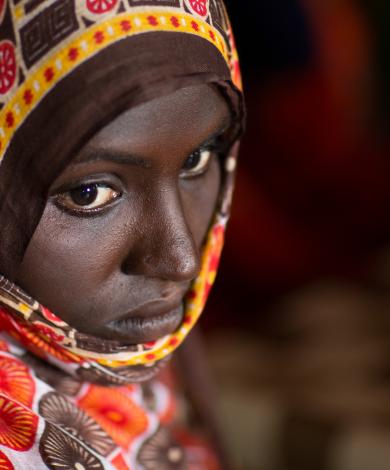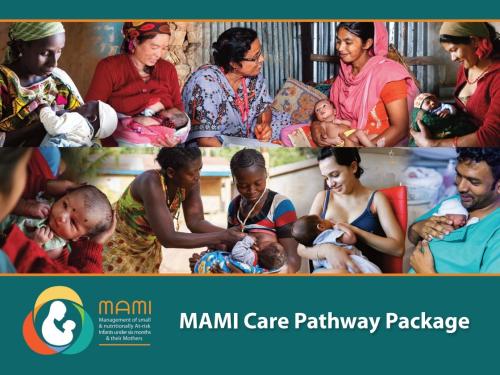Overview of research
This five year research programme (2019-2025) is testing an integrated pathway approach for risk-differentiated personalised care (MAMI Care Pathway) in outpatient clinics in Ethiopia, in a co-creative partnership between ENN, LSHTM, Jimma University and GOAL Ethiopia funded by ECF.
The programme involves formative research to inform a randomised control trial (RCT) in Jimma Zone and Deder Woreda, accompanied by a process (realist) evaluation and economic evaluation.
The ultimate goal of this research is to provide critical outcome and implementation evidence to inform national (Ethiopian) and international policy and service development with a view to future sustainable scale.
ENN is the learning and implementation research lead in the partnership, involving a pre-trial feasibility study to strengthen implementation readiness, a process (realist) evaluation accompanying the RCT and a scoping review of national policy guidance.
Phase 1
Formative research (2019 to mid-2022) involved:
- national and international stakeholder mapping (collaboration with SDG2AdvocacyHub)
- early and ongoing consultation with national and sub-national stakeholders (see more information)
- consultation with international policy makers, programmers and researchers
- quantitative research on caseload and anthropometric profile
- qualitative research on community perceptions of malnutrition
- qualitative research to strengthen implementation readiness: pre-trial feasibility study
- secondary data analysis to explore associations between maternal mental health and infant nutritional status (pending publication)
Phase 2
The RCT was launched in October 2022 in Jimma Zone and Deder Woreda. It is two armed (intervention and control) trial involves 30 randomly allocated clusters (heath centres) in Jimma and 9 clusters in Deder Woreda. Our target population are small and/or nutritionally at-risk infants aged <6m, as defined by the presence of anthropometric and non-anthropometric criteria.
The intervention health centres use the MAMI Care Pathway Package (adapted during formative phase), which involves regular follow-up to 6 months and structured support at outpatient facility level embedded within existing IMNCI-based services. It includes tailored support for specific clinical and feeding problems, and counselling on six core topics: relaxation, crying/sleep, nurturing care, family and community support, family planning, and complementary feeding.
The control health centres follow the standard Ethiopia 2019 severe malnutrition guidelines, which focus on inpatient care for infants with WLZ <-3 and/or severe feeding problems. Follow-up for other at risk infants is based on clinical judgement.
We will assess and report the main outcomes when infants reach 6 months of age. We will also conduct longer-term follow-ups at 12-, 18-, and 24-months.
The primary outcome is infant growth, measured by mean WAZ at age 6 months.
The main secondary outcomes are:
- Infant growth: mean LAZ; prevalence of WLZ <-2; prevalence of MUAC <125mm.
- Infant feeding: prevalence of infants u6m reported to have been breastfed in the past 24hrs.
- Infant morbidity: Recent (2-week) diarrhoea/fever/cough; clinically significant illness episodes.
- Maternal: mental health (PHQ-9 questionnaire); Quality of Life (WHO short questionnaire).
A process (realist) evaluation was being conducted in tandem, led by ENN to investigate if and how it has worked, for whom, under what circumstances, and an economic evaluation led by Jimma University. To help evidencing policy processes, a scoping review of national policy guidance in collaboration with the MOH advisors is also underway, due for completion early 2025.
Latest update
RCT enrolment was completed in August 2023 and intervention period completed December 2023. RCT results of 6 month follow up outcomes will be available mid 2024 and launched in meetings in Ethiopia. Results from the process (realist) evaluation will also be available mid-year, helping to contextualise the RCT findings and provide critical implementation evidence to inform national policy-makers. Economic evaluation will be available end of 2024.
Future plans
RCT follow up at 12 months of age will be completed July 2024. Pending funding, we intend to follow up at 18 months and 24 months of age (interested funders, please contact us below). Follow up consultations with findings will take place in Ethiopia in January 2025.
For more information, contact: Marko Kerac, LSHTM, marko.kerac@lshtm.ac.uk or Marie McGrath, ENN, marie@ennonline.net
Meet the team
The research partnership comprises a strong team of experienced researchers and practitioners at London School of Hygiene and Tropical Medicine (LSHTM) (overall lead & coordinator), Jimma University (academic lead, Ethiopia), GOAL (operational) and ENN (process evaluation and learning).
| LSHTM Marko Kerac, Principal investigator Carlos Grijalva-Eternod, Co-investigator and Research Manager Emma Beaumont, Statistician & Data Manager Prof Elizabeth Allen, Professor of Medical Statistics | GOAL Hatty Barthorp, Research Advisor Anley Haile, Research Lead (to 2021) Endashaw Haile, Research Lead (from 2021) Abdulhakim Ali, Research focal point Ritu Ranu, Co-investigator, MAMI Advisor (to 2021) |
| Jimma University Melkamu Berhane, Principal investigator (Jimma and Deder) Prof Tsinuel Girma, Senior Co-investigator Prof Alemseged Abdissa, Senior Co-investigator Mubarek Abera, Co-investigator Shimelis Girma, Co-investigator Kiddus Yitbarek, Co-investigator Nega Jibat, Co-investigator (to 2021) | Additional Prof Jonathan Wells (UCL), Co-investigator/technical advisor Dr Hannah Blencowe (LSHTM), Co-investigator/technical advisor National Technical Advisory Group National Data Safety and Monitoring Board (DSMB) |
| ENN Marie McGrath, Co-investigator |
Key resources
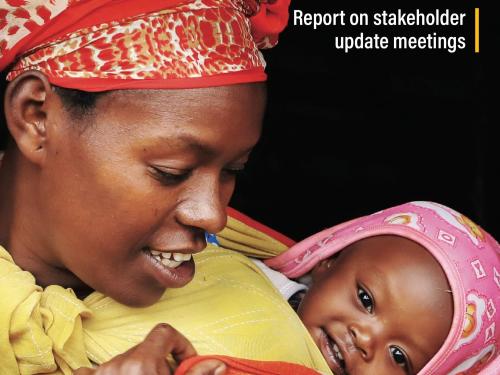
Cluster Randomised Trial in Ethiopia: Report on stakeholder update meetings
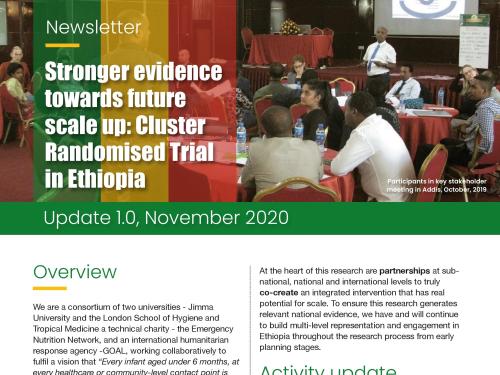
Cluster Randomised Trial in Ethiopia: Update 1.0, November 2020
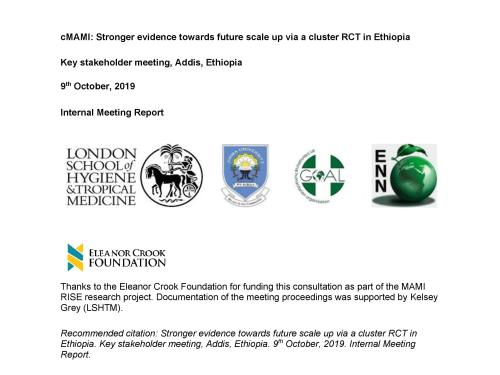
Cluster Randomised Trial in Ethiopia: Key stakeholder meeting, Addis, Ethiopia
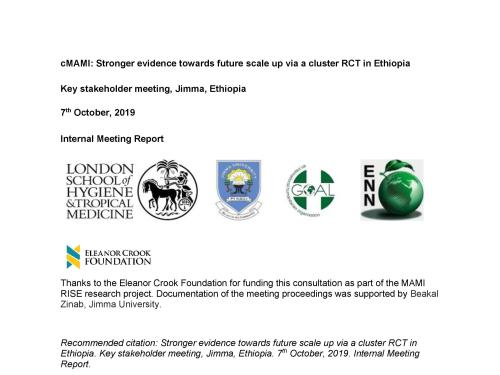
Cluster Randomised Trial in Ethiopia: Key stakeholder meeting, Jimma, Ethiopia
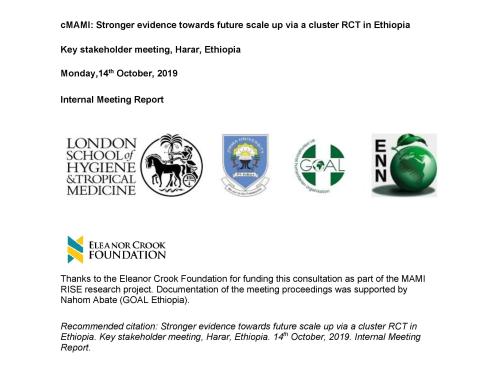
Cluster Randomised Trial in Ethiopia: Key stakeholder meeting, Harar, Ethiopia
Carlos Grijalva-Eternod (LSHTM) and Marie McGrath (ENN).
London School of Hygiene and Tropical Medicine (LSHTM) and Eleanor Crook Foundation (ECF).
